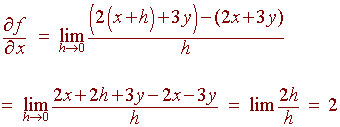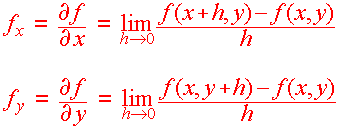| Partial Derivatives Definition of a Partial Derivative
if these limits exist. Algebraically, we can think of the partial derivative of a function with respect to x as the derivative of the function with y held constant. Geometrically, the derivative with respect to x at a point P represents the slope of the curve that passes through P whose projection onto the xy plane is a horizontal line. (If you travel due East, how steep are you climbing?) Example Let f(x,y) = 2x + 3y then  We also use the notation fx and fy for the partial derivatives with respect to x and y respectively. Exercise: Find fy for the function from the example above. Finding Partial Derivatives the Easy Way Since a partial derivative with respect to x is a derivative with the rest of the variables held constant, we can find the partial derivative by taking the regular derivative considering the rest of the variables as constants. Example Let f(x,y) = 3xy2 - 2x2y then fx = 3y2 - 4xy and fy = 6xy - 2x2 Exercises Find both partial derivatives for
Higher Order Partials Just as with function of one variable, we can define second derivatives for functions of two variables. For functions of two variables, we have four types: fxx, fxy fyx and fyy Example Let f(x,y) = y ex then fx = yex and fy = ex Now taking the partials of each of these we get: fxx = y ex fxy = ex fyx = ex and fyy = 0 Notice that fxy = fyx
Functions of More Than Two Variables Suppose that f(x,y,z) = xy - 2yz is a function of three variables, then we can define the partial derivatives in much the same way as we defined the partial derivatives for three variables. We have fx = y fy = x - 2z and fz = -2y Application: The Heat Equation Suppose that a building has a door open during a snowy day. It can be shown that the equation Ht = c2Hxx models this situation where H is the heat of the room at the point x feet away from the door at time t. Show that H = e-t cos(x/c) satisfies this differential equation. Solution We have Ht = -e-t cos(x/c) Hx = -1/c e-t sin(x/c) Hxx = -1/c2 e-t cos(x/c) So that c2Hxx = -e-t cos(x/c) And the result follows. |
MANIC FM
Saturday, July 24, 2010
Vectors Calaulus 1.12
Subscribe to:
Post Comments (Atom)

No comments:
Post a Comment